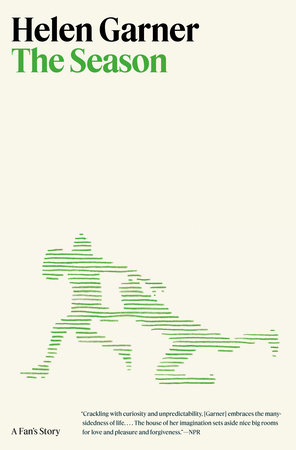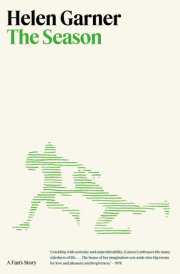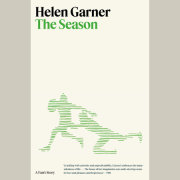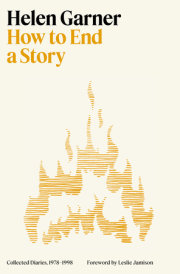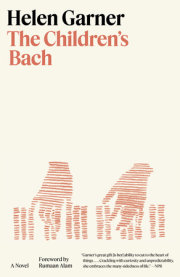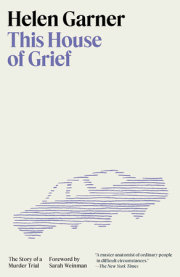I pull up at the kerb. I love this park they train in. I must have walked the figure-of-eight round its ovals hundreds of times, at dawn, in winter and summer, to throw the ball for Dozer, our red heeler—but he’s buried now, in the backyard, under the crepe myrtle near the chook pen.
The boy jumps out with his footy and trots away, bouncing it.
Boy? Look at him. He’s been playing with our suburban club since he was a tubby little eight-year-old; I have never paid more than token attention to his sporting life. But this year he’s in the Under-16s. The shoulders on him! He must be almost six feet tall. He’s the youngest of my three grandchildren. The last, and there will be no more.
—
At breakfast time I say, ‘Can I start coming to training?’ ‘What? Why?’
‘I don’t know. I’ve got no work. I’m burnt out. I don’t know what to do with myself. I need something to write about.’
‘You better ask the coach.’ ‘Who’s the coach?’
‘We’ve got a new one. It’s Archie.’
‘What? The Archie we know? Isn’t he only a boy? How old is he?’
‘About twenty,’ says Amby’s mum, who remembers important facts.
Can you be a coach when you’re only five years older than the players?
—
Under an umbrella outside the cafe, tall and skinny, white T-shirt and baseball cap: is that him? I come up behind him and he turns. Pale skin, bright blue eyes with black lashes. Face-splitting grin. Clever, funny, jumping out of his skin; ready to pick up a thought and go with it. ‘Footy,’ he says, ‘is the most hilariously unnatural sport. Running
backwards!’ He’s at uni. He gets what I’m after.
‘Will I have to ask the club?’ ‘Nah. Just turn up.’
‘What about the players?’
‘Helen. They’re fifteen. They’re boys. They won’t care. And five minutes later they’ll have forgotten you were even there. They’re fifteen-year-old boys trying to be men.’
He tips back his head in a fit of laughter.
—
All my life I’ve fought men, lived under their regimes, been limited and frustrated by their power; but in the first decade of the century I became a grandmother to a girl and two boys, a hands-on nanna who by some unimaginable miracle was invited to buy the house next door, knock down the fence, and become part of family life.
The girl and I understood each other at first glance. But having never raised a son, I now began to learn about boys and men from a fresh angle, to see their delicacy, their fragility, what they’re obliged to do to themselves in order to live in this world, the codes of behaviour they’ve had to develop in order to discipline and sublimate their drive to violence.
The pandemic came. Melbourne copped more lockdowns than any other city in the nation. That’s when footy really got a grip on me. It made me feel lucky to be alive. I learnt that when the chips are down, football rises. I saw that it’s a kind of poetry, an ancient common language between strangers, a set of shared hopes and rules and images, of arcane rites played out at regular intervals before the citizenry. It revives us. It sustains us. In a time of fear and ignorance, it holds us above the abyss. And I started to glimpse what is grand and noble, and admirable and graceful about men.
But I keep quiet about this, because I don’t want people to think I’m romanticising it, or to reproach me for not writing about women’s footy. And I have to admit that, more than anything, this is about me and my grandson. Now that I’ve reached the age at which my mother died demented, now that my hearing and my eyesight are packing up and I can feel my memory starting to lose its grip, I need a reason to be near him, in the last years of his childhood. I want to know him better before it’s too late, to learn what’s in his head, what drives him; to see what he’s like when he’s out in the world, when he’s away from his family, which I am part of; so in order to learn about his other life, I’m going to have to find a way to efface myself, to become a silent witness.
FebruaryAt five o’clock on a late summer afternoon I drive him to the first pre-season training of the year. His thighs are so long that his knees almost press against the glove box.
‘Do you get nervous before training?’ ‘No.’
‘Before a match?’
‘Yes. I get nervous for days before a match and on the morning of the game when I wake up. But as soon as you get out there on the ground, it’s all gorn.’
In no other context does he pronounce
gone like this. Is it a football thing?
‘What position do you play?’ ‘Midfield, mostly.’
‘I don’t even know what that means.’
‘It means I’m always on the ball. I get plenty of action. Unless I’m tagging someone.’
What is tagging? I don’t want to admit to him that although I have followed the Western Bulldogs with a passion since before he was born I still hardly understand the rules.
The air is parched. Everything is standing still, bearing down. Boys are gathering slowly on the oval. I let him get out first. No boy would want to arrive at training with his nanna in tow. Away he jogs, shouldering his bag.
Where am I going to put myself, with my brand-new notebook hidden in the back pocket of my overalls? There are no seats. Wait, there’s one, near the goalposts and the water bubbler at the western end, a big old-fashioned park bench made of thick wooden slats. When I sit on it, the metal bound- ary rail cuts straight across my line of vision. I hoist myself up on to the high, curved back of the bench and perch there, looking around.
This is the inner west. The air is full of a low metallic noise. Twenty metres behind me skateboarders are gliding up and down their steep curves of concrete. Suburban trains clatter back and forth along the southern edge of the park. On the other side of the raised railway track lies a vast tunnel excavation and construction site. Earth-moving behemoths roll ponderously, men march about in hi-vis and helmets. Beyond the site rise the blocky tops of many-coloured containers, the odd crane. An ambulance siren wails past, coming up from the river. What the hell am I doing here?
Archie the coach strides past my possie and flashes me a smile. I’m surprised to hear myself say, ‘Hey, boss.’ He begins to lay out near the goals a series of white plastic cones. A man with two dogs on leads ducks under the boundary fence and barges right through his careful pattern.
As the boys gather round the coach I start to notice physical types: one with a distance-runner’s sinewy legs and a cloud of curly fair hair like the Western Bulldogs’ Cody Weightman, an icon in our house; another blond one, shy-looking, skinny and fine, a head shorter than the rest but wiry; an Asian boy, composed and watchful, with a strikingly adult face and a smooth black ponytail.
They are busy now handling the new-looking yellow footballs. I will never understand the physics of it: how they can run and bounce them like that and get the wonky oval ball to obey them so they never pause or trip or stumble.
A late arrival in a Bloods T-shirt drops on to his back in the grass and takes a selfie; the low sun catches a big ‘diamond’ in his earlobe. His teammates, ignoring him, form two circles and start a manic handball drill, shouting each other’s names in triplets, in nasal, broken voices: ‘TommyTommyTommy. NedNedNed. XavierXavierXavier.’
The dull roar from the construction site cuts out. A tiny warm breeze passes from the north. A magpie warbles. An Indian woman in sports clothes walks past me murmuring an unbroken monologue into her phone. I could sink into a summer-evening trance. But the coach shouts, ‘Boys. It’s full contact and we’ll go hard.’ I sit up.
A boy does a bad kick, a real dud. ‘Hopeless,’ he mutters, and leans forward in a posture of shame.
The coach says, ‘That’s a dollar.’
Fast play, now. The smell of the grass they’re crushing reaches me. I’m fully awake. A boy takes a clean mark and I hear myself hiss: ‘Yessss!’ Someone spits. The first mozzie of the evening stings my arm. The coach leaps into the game, twists like a dancer, handballs behind him. His greater height, his greater skill. His cap flips half off his head; he snatches it and flings it back over his shoulder with his left hand while casually marking the ball in his right. A running boy sees the cap on the grass, pauses, looks down at it respectfully: the coach’s cap. Should he pick it up? No. He straightens and runs on. Between bouts of action whoever is holding the ball will spin and flip it from hand to hand: it’s always moving.
Balls in a final kick to kick are flying all over the place. Amby is way over there on my right, close to the southern boundary. I see him take a mark and turn to two hi-vis tradies who are leaning over the fence, calling out to him. He veers away from them laughing and sinks his boot into the ball.
It’s hot. They train for only an hour. Driving away from the park I chuck an illegal U-ey and halfway into my turn see a car heading east at speed. I have to swerve into the parking lane to avoid a collision.
‘Shit,’ I say. ‘That was a dumb piece of driving.’ ‘It was Archie.’
‘Oh no. Did he see it was me?’
‘Yes. He looked right at me and laughed.’
From the kerb I text him a shame emoji: ‘I don’t usually drive like that.’
‘Ha ha,’ he replies. ‘Don’t worry I didn’t see anything.’
—
Back at our place I’m knocking up tuna rice for tea when Amby’s older brother walks in from university O-week, looking cool and interesting in his black singlet. He says he’s met some people and they’d been planning to go to a club, but he would have had to wait around for four hours, so he decided to come home. ‘I’m fatigued,’ he says. ‘Not just tired. Fatigued.’ He and Amby compare notes on this distinction.
Next morning at breakfast Amby complains grandly of his soreness.
‘Were you aware of me watching?’ ‘Yes.’
‘What, all the time?’ ‘Yes.’
‘Oh damn. I was hoping that wouldn’t happen.’
‘I wasn’t distracted. It inspired me to do cool things so I’d be in the book.’
—
As wallpaper on my phone I’ve got a press photo of the Western Bulldogs’ captain, Marcus Bontempelli, at a moment of defeat, helping Josh Bruce off the ground after his already replaced knee has given way. Bont’s arm is around his teammate, his cheek pressed against the stumbling man’s shoulder: their huge spread hands, Bruce’s ragged man-bun falling in strands, his face lowered in pain and despair. I was once reproached by all my grandchildren for having in my phone a photo of three U10 players leaving the field at the final siren: two of them towered over the one in the middle, a very small boy whose bravery I greatly admired. They shouted at me: it was ‘disturbing’, they said, that I had this photo of a child in my phone.
What? I was furious, I argued with all my force, but they got me on the ropes, and their parents supported them: ‘How would
you feel, Hel, if some stranger had a photo of you in their phone?’ In my heart I never bowed to them, but I pretended to, to keep the peace. And now I show Amby the photo of Bont and Bruce, this Homeric scene of brotherly tenderness and care, and I say in a mocking tone, ‘Is it “disturbing” to you, that I’ve got this photo in my phone?’
He looks at it, recognises it. ‘No,’ he says, declining to bite. ‘I love that photo.’
—
‘Is Collingwood the only AFL team with a curse on it?’ says my friend, an aesthetically sophisticated woman of my age who doesn’t care a fig for footy but knows the ancient myths and sees the point of them. ‘The curse of being working class? The brutal frontline fighters. The Bulldogs are the boys from Sparta, small, leaner, better-contained—they’re the second line. But the boys from Melbourne…maybe they’re cursed by their heritage of pomp?’
I can take any amount of this.
‘Football’s a mirror of war,’ she says, ‘a mirror we can look into safely. And the reason people are so crazy about this particular mirror is that war is as close as we ever get to being in the midst of life and death simultaneously. It’s some sort of critical human state being played out. At an unconscious level.
I am alive now—I could die in an hour.’
I send her a photo of the Western Bulldogs’ Ed Richards, and ask her the right word for the colour of his magnificent red hair.
‘I’d call it titian,’ she replies. ‘Once I stopped a thirteen-year- old boy on the street in Gisborne, who had this hair colour. He called it “chestnut, and not mahogany”.’
Ed Richards, she thinks, looks ‘sweet, modest, noble. Which phalanx would he be best in?’
I go to the Bulldogs’ website and watch Ed Richards highlights edited into a flow. His dark-burning hair against the bright green of the grass. His speed and grace. How the hell do they keep
running for all that time?
—
Second pre-season training, a Monday. The boys seem further away today, smaller. Wind out of the south-west, different from last time, steady and cool. I’ve got a coat and I’m grateful for it. I can’t sense what’s going on. A lot of handball. Trains are drowning out the coach’s voice, the wind squeals in my hearing aids. Angus, the tall thin boy in the Bloods T-shirt, has had a buzz cut since last time. Where’s his flashy earring? Stripped of the softness of hair he looks younger, paler. Magpies peck at the turf. Mynahs squabble on the boundary fence. My teeth would be chattering with cold if I wasn’t clenching them. I’m dismayed: is this boring? Am I bored? I am very rarely bored. I’m not the boreable
type. Then it strikes me that this is the essence of the thing I’m studying: constant changes of mood and condition.
Amby is disconsolate on the drive home. Staggering into the kitchen, sweaty and mad at himself for not having done well on the field, he looks around wildly and says, ‘I know what I want. I want SOUP!’ And of course there is none. But next time there will be.
Copyright © 2025 by Helen Garner. All rights reserved. No part of this excerpt may be reproduced or reprinted without permission in writing from the publisher.

